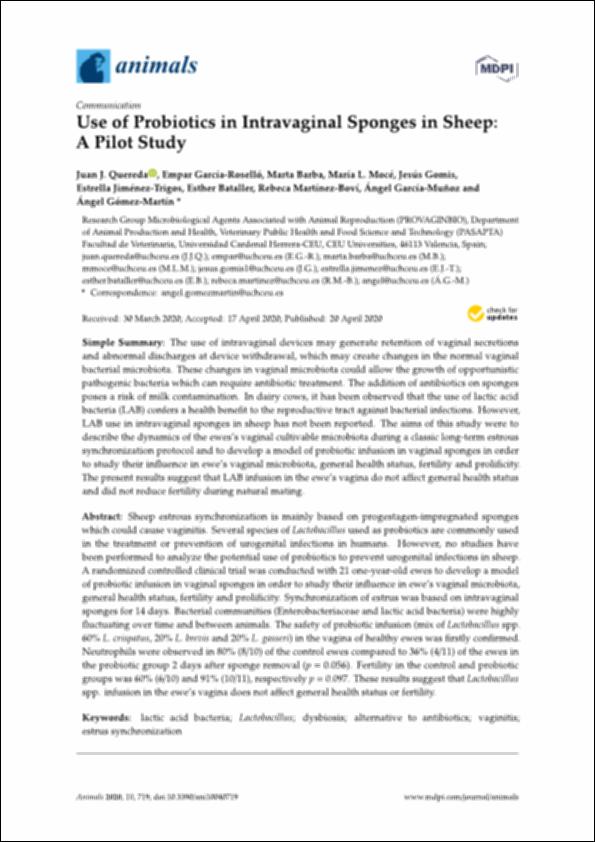Please use this identifier to cite or link to this item:
http://hdl.handle.net/10637/12535Use of probiotics in intravaginal sponges in sheep : a pilot study
| Title: | Use of probiotics in intravaginal sponges in sheep : a pilot study |
| Authors : | Quereda Torres, Juan José García Roselló, Empar Barba Recreo, Marta Mocé Cervera, María Lorena Gomis Almendro, Jesús Jiménez Trigos, María Estrella Bataller Leiva, Esther Martínez Boví, Rebeca García Muñoz, Ángel Gómez Martín, Ángel |
| Keywords: | Sheep - Generative organs.; Sheep - Reproduction.; Ovejas - Aparato genital.; Sheep - Bacteriology.; Ovejas - Bacteriología.; Veterinary bacteriology.; Estrus.; Ovejas - Reproducción.; Microbiología veterinaria.; Veterinary microbiology.; Bacteriología veterinaria.; Estro. |
| Publisher: | MDPI |
| Citation: | Quereda, J.J., García-Roselló, E., Barba, M., Mocé, M.L., Gomis, J., Jiménez-Trigos, E., et al. (2020). Use of probiotics in intravaginal sponges in sheep: a pilot study. Animals, vol. 10, i. 4 (20 apr.), art. 719. DOI: https://doi.org/10.3390/ani10040719 |
| Abstract: | Sheep estrous synchronization is mainly based on progestagen-impregnated sponges which could cause vaginitis. Several species of Lactobacillus used as probiotics are commonly used in the treatment or prevention of urogenital infections in humans. However, no studies have been performed to analyze the potential use of probiotics to prevent urogenital infections in sheep. A randomized controlled clinical trial was conducted with 21 one-year-old ewes to develop a model of probiotic infusion in vaginal sponges in order to study their influence in ewe’s vaginal microbiota, general health status, fertility and prolificity. Synchronization of estrus was based on intravaginal sponges for 14 days. Bacterial communities (Enterobacteriaceae and lactic acid bacteria) were highly fluctuating over time and between animals. The safety of probiotic infusion (mix of Lactobacillus spp. 60% L. crispatus, 20% L. brevis and 20% L. gasseri) in the vagina of healthy ewes was firstly confirmed. Neutrophils were observed in 80% (8/10) of the control ewes compared to 36% (4/11) of the ewes in the probiotic group 2 days after sponge removal (p = 0.056). Fertility in the control and probiotic groups was 60% (6/10) and 91% (10/11), respectively p = 0.097. These results suggest that Lactobacillus spp. infusion in the ewe’s vagina does not affect general health status or fertility. |
| Description: | Este artículo se encuentra disponible en la siguiente URL: https://www.mdpi.com/2076-2615/10/4/719 Este artículo pertenece al número especial "Advanced technology in animals reproduction". En este artículo también participan: Esther Bataller, Rebeca Martínez-Boví, Ángel García-Muñoz y Ángel Gómez-Martín. |
| URI: | http://hdl.handle.net/10637/12535 |
| Rights : | http://creativecommons.org/licenses/by/4.0/deed.es |
| ISSN: | 2076-2615 (Electrónico). |
| Issue Date: | 20-Apr-2020 |
| Center : | Universidad Cardenal Herrera-CEU |
| Appears in Collections: | Dpto. Producción y Sanidad Animal, Salud Pública Veterinaria y Ciencia y Tecnología de los Alimentos |
Items in DSpace are protected by copyright, with all rights reserved, unless otherwise indicated.


